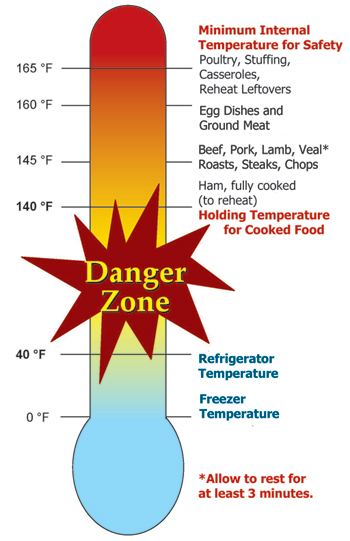As COVID-19 cases drop and the Centers for Disease Control and Prevention guidance changes, Americans are preparing to gather together to commemorate Memorial Day and honor the sacrifices so many have made to protect our country.
This holiday weekend might not be completely back to normal and public health recommendations around coronavirus should still be kept in mind, but let’s not forget food safety practices to prevent the spread of foodborne illnesses.
Those who choose to celebrate outdoor should follow these important food safety tips to keep their outdoor activities safe this Memorial Day weekend:
Careful of the heat
Summer weather can be hot and humid, which means food won’t stay safe as long as it would indoors. When the temperature outside is above 90 degrees F, perishable food such as meat and poultry, dips and cold salads, or cut fruits and vegetables are only safe out on the table for one hour.
as long as it would indoors. When the temperature outside is above 90 degrees F, perishable food such as meat and poultry, dips and cold salads, or cut fruits and vegetables are only safe out on the table for one hour.
According to a recent USDA survey, nearly 85 percent of participants said they don’t nest cold foods in ice when they serve it. Keeping cold foods cold is an important step to keep food safe and healthy, so store them on ice, in coolers, or in your fridge and freezer.
In the same survey, 66 percent of participants indicated they did not keep their cooked foods, like burgers and hot dogs, warm after cooking. Just like cold foods, hot perishable foods should be kept warm, above 140 degrees F, until they’re eaten. You can easily do this by moving these items to the side of your grill away from the main heat source, rather than taking them off the grill entirely. Make sure your grilled meat and poultry reach a safe internal temperature first by using a food thermometer.
Outdoor cooking
You may have everything you need in an indoor kitchen to be food safe, but the same may not be true for your outdoor grill or other food preparation space.
Prepare your outdoor spaces so they are food safe. If you won’t have running water, use hand sanitizer or moist towelettes to keep your hands clean before, during and after food preparation.
It’s most effective to use warm, soapy water to wash hands for at least 20 seconds before and after handling food. If you have to use hand sanitizer, make sure to choose one that contains at least 60 percent alcohol. Using moist towelettes and paper towels can help to clean and sanitize any cutting boards or utensils while you’re outside or away from your kitchen. Keeping hands and surfaces clean when handling food will help lessen the spread of germs and foodborne illness causing bacteria.
Separate raw meats, poultry and seafood from RTE foods
If you are planning to cook for the holiday weekend, inside or out, separate raw meats, poultry and seafood from other ready-to-eat (RTE) foods. Use one cooler for raw meats and poultry and another for RTE foods such as fruits, vegetables, cheese and desserts. Take two sets of plates and utensils for handling raw meats and for serving cooked foods to limit the chances of cross-contamination.
Pathogen vectors
Bags of chips, fruit platters, condiments and other foods can be vectors for pathogens due to cross-contamination by people if they don’t wash their hands. Norovirus can be spread in pools, and ponds, lakes and creeks can be a breeding ground for E. coli.
Touching playground equipment in parks and backyards can lead to bird poop on hotdogs, hamburgers and buns. Parents should make sure children wash their hands correctly and use hand sanitizers before eating.
Online Resources
For any food safety questions this summer, call the USDA Meat and Poultry Hotline at 888-MPHotline (888-674-6854) or chat live at ask.usda.gov from 10 a.m. to 6 p.m. Eastern time, Monday through Friday.
(To sign up for a free subscription to Food Safety News, click here.)

